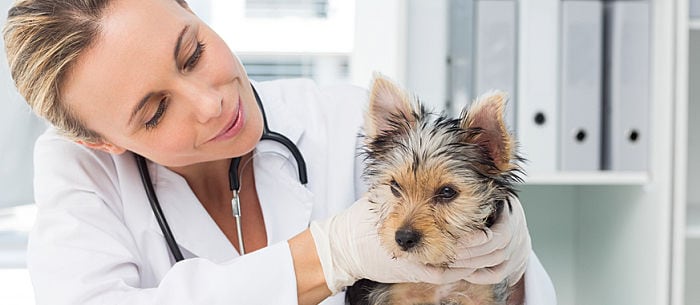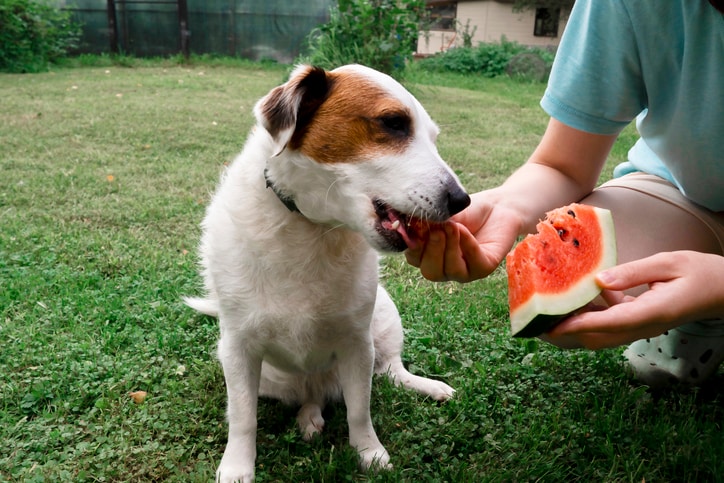Christina, a mom from Suffolk County, New York, who preferred her last name not to be used, instantly fell for her dachshund, Pickles. Her three kids were equally smitten, clamoring to hold and walk their pet every chance they got. But when Pickles started to lose weight and seemed tired all the time, Christina worried that something was seriously wrong. After doing some research on dog cancer symptoms, Christina took her pup to the vet, who confirmed that Pickles’s weight loss and lethargy were indeed signs of a tumor.
Though it’s terrible to contemplate, this type of story is not uncommon. In fact, according to the National Canine Cancer Foundation, one in three dogs will develop cancer over the course of its lifetime. “Unfortunately, many dogs are prone to cancer if they aren’t fed a species appropriate diet,” says Kim Bloomer, a veterinary naturopath at Aspenbloom Pet Care.
But a variety of other factors come into play as well, including genetics. “Certain dogs get cancer more often,” explains Dr. Jeffrey Levy, a veterinarian in New York City. According to Dr. Levy, Great Danes are prone to bone cancer, while golden retrievers are more likely to get lymphoma and boxers are prone to mast cell cancer.
Cocker spaniels and standard poodles often develop different types of cancer, while short-haired dogs with white coats, such as dalmatians and pit bulls, seem to develop skin cancer more often than other breeds, says Dr. Levy.
Although considering the possibility that your beloved dog will come down with cancer can be heartbreaking, you should try your best to not focus on the worst-case scenarios. By knowing which symptoms to look out for, you can arm yourself with the information you need to catch this illness early on, which can make all the difference in your pet’s diagnosis.
Here are 12 common dog cancer symptoms that you should be aware of:
1. Lump or mass
“Dark growths could be a sign of melanoma, especially when found on the legs and paw pads,” says Dr. Levy. If your dog has developed a lump or mass, you should take him to the vet, who will likely perform a biopsy. You should be especially wary if your dog’s growth seems to be getting bigger as time goes on.
2. Unusual odors
All dogs have bad breath! But if you detect a particularly foul smell emanating from your pooch’s mouth even with regular grooming, it could be a sign of oral cancer.
3. Abnormal discharge
If an excessive amount of unusual fluids, such as blood or puss, are oozing from your pup, you should relay this information to your vet immediately, as this could be a sign of cancer in the GI tract.
4. Bloating
A swollen belly may indicate a worrisome buildup of fluid, possibly caused by a tumor in the GI area.
5. Weight loss
Obesity in dogs is a common concern, but if your pet slims down too much or drops pounds quickly and unexpectedly, this could be a sign of lymphoma or lymphosarcoma. Pickles lost weight and seemed tired all the time, which gave his owners a clue that something was wrong.
6. Lethargy
Is your active, happy puppy suddenly not interested in toys or going out for a walk? These types of changes in your dog’s behavior can indicate a variety of different illnesses, including cancer. Lethargy was one of the clues that something was wrong with Pickles.
7. Difficulty eating
Does your dog have trouble swallowing his food? This can be a symptom of oral cancer.
8. Loss of appetite
Most dogs can’t wait for dinner, so if your pet is starting to ignore his usual yummy meal, like Pickles did, this might mean that something is off. Your dog’s sudden change in appetite may result from bouts of nausea, which is associated with various different types of cancer.
9. Trouble urinating
Changes in your dog’s bathroom behavior could potentially indicate cancer in the bladder or kidneys. As such, you should take notice if you find that your dog is starting to relieve herself less frequently or is having difficulty passing a bowel movement.
10. Non-healing growths
“Bumps, wounds or any erosion of the skin could mean a number of different cancers,” says Dr. Levy. If you find any unusual growths on your pup’s skin, you should have your vet check it out.
11. Difficulty breathing
Symptoms of lung or heart tumors can include rapid or irregular respiration.
12. Increased drinking or urinating
If your dog is drinking or relieving himself more than usual, you should take notice. This behavior could potentially indicate that he has a slow-growing tumor of the hypothalamus in the base of his brain or adrenal gland.
The best way to ensure that you can detect a potential illness early on is to examine your dog each day and note any changes in her behavior. If you do notice any unusual changes, you should contact your veterinarian right away. By reaching out to Pickles’s vet immediately, Christina was able to think about treatment options and work toward getting her pup the help he needed.
Jennifer Kelly Geddes is a New York-based writer and editor who specializes in parenting, health and child development. She’s a frequent contributor to Care.com and the mom of two teen girls.
* This article is for general informational purposes only. It is not intended nor implied to be providing medical advice and is not a substitute for such advice. The reader should always consult a health care provider concerning any medical condition or treatment plan. Neither Care.com nor the author assumes any responsibility or liability with respect to use of any information contained herein.


